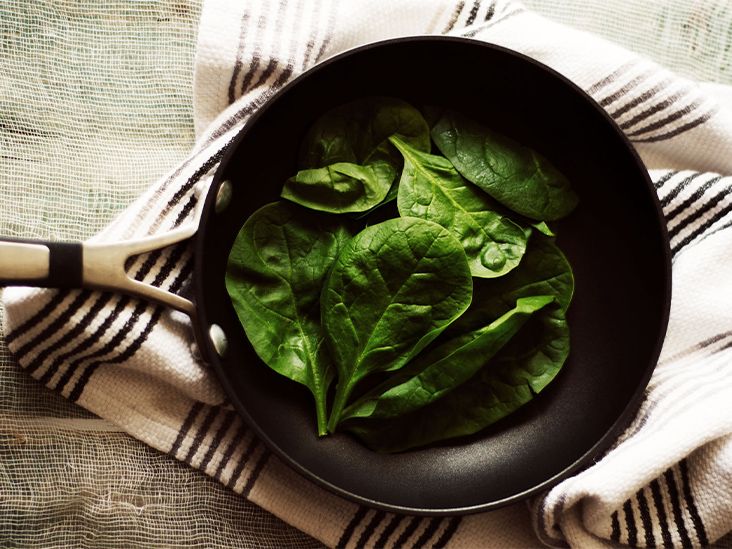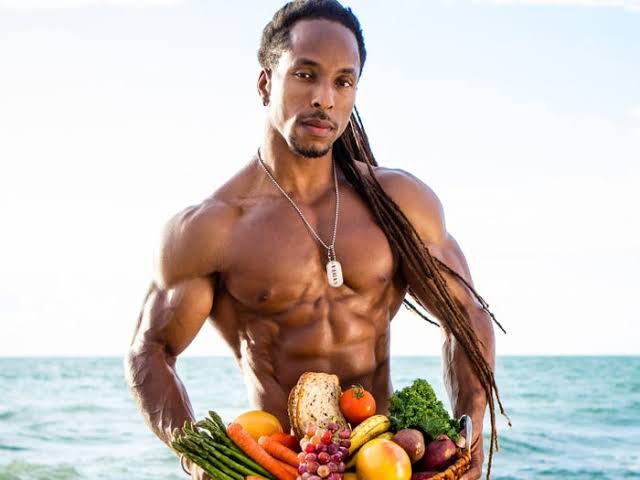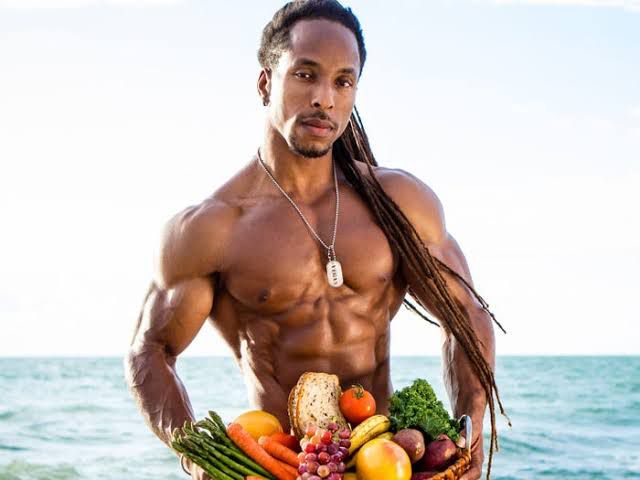This guide delves into the benefits and challenges of adopting a plant-based diet for bodybuilding. It highlights how a plant-based diet can enhance heart health, digestion, and muscle recovery while providing practical advice on overcoming potential obstacles like protein intake and micronutrient needs to help bodybuilders achieve their fitness goals.


What is a Plant-Based Diet?
A plant-based diet, at its core, focuses on consuming foods that come from plants, such as vegetables, fruits, grains, legumes, nuts, and seeds, while minimizing or completely avoiding animal products like meat, dairy, and eggs. Now, don’t confuse it with a vegan diet, which eliminates all animal products, including honey and some processed foods. A plant-based diet can include some animal-derived products, but the emphasis is on plant foods.
For bodybuilding, a plant-based diet means focusing on nutrient-dense foods that support muscle repair, growth, and recovery, while also improving overall health. This is something that can benefit you, not just in terms of bodybuilding, but for your long-term well-being as well.
Benefits of a Plant-Based Diet for Bodybuilders
Improved Heart Health: One of the greatest advantages of a plant-based diet is its impact on heart health. Plant-based foods are rich in fiber, antioxidants, and healthy fats, all of which help lower blood pressure and cholesterol levels. Since bodybuilders tend to consume high amounts of protein, a plant-based diet can offer more heart-healthy sources of protein, unlike red meats, which can raise bad cholesterol levels.
Better Digestion: Bodybuilding requires intense training and recovery, and your body needs the best fuel. With the high intake of fiber from plant-based foods, digestion becomes smoother, which is key for muscle recovery. A healthy gut can better absorb essential nutrients, such as amino acids, which play a critical role in muscle repair and growth.
Weight Management: A plant-based diet is typically lower in calories and saturated fats compared to animal-based products. This doesn’t mean you won’t consume enough to build muscle, but it means that your fat intake will be healthy and that you will stay leaner. For bodybuilders, this is crucial because it helps maintain a lean physique while still gaining muscle mass.
Anti-inflammatory Properties: Intense workouts cause inflammation in your muscles, and a diet rich in plant-based foods can help reduce this inflammation. Foods like berries, leafy greens, and nuts are packed with antioxidants that promote recovery and reduce muscle soreness. This gives your muscles the chance to repair and grow without being hindered by inflammation.
Hormonal Balance: Some studies suggest that plant-based diets can support better hormonal balance due to the high levels of antioxidants and phytonutrients found in plant foods. Hormonal regulation is essential for muscle growth, and having a balanced hormone system supports lean muscle mass development, especially testosterone.
Sustainable and Ethical: A plant-based diet is better for the environment. Choosing plant foods over animal products helps reduce the carbon footprint, conserves water, and decreases deforestation. By choosing a plant-based diet, you also reduce animal suffering, making it a more ethical choice for many individuals. So, by sticking to plants, you’re not just helping your body but also the world around you.

Challenges of a Plant-Based Diet for Bodybuilders
Protein Intake Concerns: One of the biggest challenges you might face as a bodybuilder on a plant-based diet is ensuring you get enough protein. Protein is essential for muscle repair and growth, and while plants can provide protein, it may not always be as complete or as abundant as animal-based sources. Some plant-based foods, like beans, lentils, chickpeas, quinoa, and tofu, contain adequate protein, but the key is ensuring variety in your food choices to get all the essential amino acids.
It’s important to combine different plant proteins to create a “complete protein,” such as combining beans with rice or hummus with whole grain pita. Many plant-based bodybuilders also turn to vegan protein powders made from peas, hemp, or brown rice to meet their protein needs, especially after workouts.
Inadequate Micronutrients: Certain micronutrients like vitamin B12, vitamin D, iron, calcium, and omega-3 fatty acids are found in higher quantities in animal products. For someone on a plant-based diet, this can be a concern. You will need to be extra mindful to ensure you’re getting enough of these nutrients. For instance, vitamin B12 is essential for red blood cell production and overall energy levels, and since it’s only naturally available in animal products, you may need to take a supplement or consume fortified plant-based foods like cereals, nutritional yeast, or plant milks.
You can get enough iron from leafy greens, beans, and fortified cereals, but you must pair them with vitamin C-rich foods like oranges or bell peppers to increase absorption. For omega-3s, try chia seeds, flaxseeds, or algae-based supplements. Don’t forget calcium; tofu, fortified plant milk, and leafy greens can fill this gap.
Caloric Density: Plant-based foods can sometimes be less calorically dense compared to meat, which means it may be harder to consume enough calories to build muscle if you’re not eating enough or eating the right foods. You’ll need to focus on consuming larger portions of calorie-dense plant foods such as nuts, seeds, avocados, and whole grains to meet your energy needs. This can be challenging for people with higher caloric requirements.
Social and Practical Challenges: Sometimes, it’s not easy to find plant-based options when eating out or during family gatherings. Many meals in social settings revolve around animal-based products, and being the only person eating differently might make you feel isolated. It’s also possible that you’ll need to spend extra time meal prepping, cooking, and reading food labels to ensure you’re sticking to your diet.
Adapting to New Cooking Techniques: Transitioning to a plant-based diet requires learning new cooking techniques, trying unfamiliar ingredients, and finding creative ways to satisfy your cravings. While it can be fun and rewarding, it may feel overwhelming at first. But with time, you’ll become more comfortable with plant-based cooking, and your meals will be just as satisfying as they were before!
How to Overcome These Challenges
Supplement Smartly: As mentioned, some nutrients may be harder to get on a plant-based diet, so it’s important to incorporate supplements where necessary. A good multivitamin, vitamin B12, and possibly a vegan omega-3 supplement can help you meet your nutritional needs without compromising your muscle gains.
Track Your Intake: Tracking your food intake can help ensure that you are getting enough protein, calories, and essential nutrients. There are plenty of apps and websites that can help you monitor your meals and make sure you’re fueling your body properly.
Focus on Nutrient-Dense, High-Calorie Foods: Eat more calorie-dense plant-based foods like nuts, seeds, avocado, tofu, tempeh, and whole grains. Include snacks like protein bars and smoothies made with plant-based protein powders, nut butter, and fruits to help boost your calorie and protein intake.
Educate Yourself and Plan Ahead: Planning your meals ahead of time will make it easier to meet your bodybuilding goals while sticking to your plant-based diet. Learn how to combine plant proteins, experiment with new recipes, and get creative in the kitchen.
Conclusion
As you embark on your bodybuilding journey, a plant-based diet can be a rewarding choice for your muscles, overall health, and the planet. While it comes with its challenges—such as ensuring adequate protein, micronutrient intake, and caloric consumption
the benefits far outweigh the hurdles. With proper planning and understanding, you can make a plant-based diet work for you and reach your bodybuilding goals without compromising your health.
You can thrive as a plant-based bodybuilder, my dear, and I believe in your ability to achieve whatever you set your mind to. Be patient with yourself and enjoy the journey!
Q&A Section
Q1: Can a plant-based diet provide enough protein for muscle growth?
Ans) Yes, a plant-based diet can provide adequate protein for muscle growth. The key is to eat a variety of plant proteins to ensure you’re getting all the essential amino acids your muscles need. Foods like lentils, quinoa, tofu, chickpeas, and plant-based protein powders are great options.
Q2: How can I get enough vitamin B12 on a plant-based diet?
Ans) Vitamin B12 is not naturally found in plant-based foods, so you’ll need to take a supplement or consume fortified foods like plant milk, nutritional yeast, and breakfast cereals. Be sure to get your B12 levels checked periodically.
Q3: Are there any risks associated with a plant-based diet for bodybuilders?
Ans) The main risk is not getting enough calories, protein, or certain micronutrients like vitamin B12 and iron. However, with proper planning and supplementation, these risks can be avoided.
Q4: How do I ensure I’m getting enough calories on a plant-based diet?
Ans) Focus on eating calorie-dense foods like nuts, seeds, avocados, tofu, and legumes. You may also need to eat larger portions or more frequent meals to meet your caloric needs.
Q5: Is a plant-based diet better than a diet that includes animal products for bodybuilding?
Ans) It depends on your preferences and goals. Both diets can support muscle growth if planned properly. A plant-based diet may offer additional health benefits like improved heart health and reduced inflammation, but animal products can also provide easy-to-digest protein sources. Choose what works best for your body!
